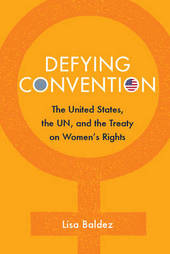
|
Defying Convention: US Resistance to the UN Treaty on Women's Rights
Paperback / softback
Main Details
| Title |
Defying Convention: US Resistance to the UN Treaty on Women's Rights
|
| Authors and Contributors |
By (author) Lisa Baldez
|
| Series | Problems of International Politics |
|---|
| Physical Properties |
| Format:Paperback / softback | | Pages:249 | | Dimensions(mm): Height 228,Width 151 |
|
| ISBN/Barcode |
9781107416826
|
| Classifications | Dewey:323.34 |
|---|
| Audience | | Tertiary Education (US: College) | | Professional & Vocational | |
|---|
| Illustrations |
2 Tables, unspecified
|
|
Publishing Details |
| Publisher |
Cambridge University Press
|
| Imprint |
Cambridge University Press
|
| Publication Date |
11 August 2014 |
| Publication Country |
United Kingdom
|
Description
The Convention on the Elimination of All Forms of Discrimination against Women (CEDAW) articulates what has now become a global norm. CEDAW establishes the moral, civic, and political equality of women; women's right to be free from discrimination and violence; and the responsibility of governments to take positive action to achieve these goals. The United States is not among the 187 countries that have ratified the treaty. To explain why the United States has not ratified CEDAW, this book highlights the emergence of the treaty in the context of the Cold War, the deeply partisan nature of women's rights issues in the United States, and basic disagreements about how human rights treaties work.
Author Biography
Lisa Baldez is Associate Professor of Government and Chair of Latin American, Latino, and Caribbean Studies at Dartmouth College. She holds a BA from Princeton University and a PhD from the University of California, San Diego. She is the author of Why Women Protest: Women's Movements in Chile (Cambridge, 2002) and the co-editor of Political Women and American Democracy (Cambridge, 2008). Her articles have appeared in the American Journal of Political Science, Latin American Politics and Society, Legislative Studies Quarterly, and the Journal of Legal Studies. She and Karen Beckwith co-founded the journal Politics and Gender.
Reviews'Breaking with the conventions in political science that create stark distinctions between the study of domestic politics within nation-states and the study of international relations, Lisa Baldez takes a novel approach to the Convention to Eliminate All Forms of Discrimination against Women (CEDAW). Steeped in the literatures on international organizations, international law, US politics, and women and politics, Baldez demonstrates how the use of gender as an analytical category complicates what is thought to be known about the creation and ratification of international conventions, the status of women in the world over the past half century, and the central cleavages in national politics in both the United States and Chile. This book is thoroughly researched and clearly written, and it covers ground that has not been addressed previously. Baldez's approach is both thought-provoking and provocative.' Mary Hawkesworth, Rutgers, The State University of New Jersey 'This is a lively and important book on an understudied topic, which makes valuable theoretical insights in international relations while providing rich data on CEDAW as a case study of a human rights treaty. Using the puzzling case of US non-ratification of CEDAW, Lisa Baldez convincingly argues that by all rights, the United States should have ratified CEDAW, given that the costs of doing so would be low and the norms embodied in the treaty are rhetorically consistent with US political values. Using fascinating primary sources, Baldez's analysis of the domestic and international obstacles to ratification brings the insights of comparative politics and international relations together in an original way.' Valerie Sperling, Clark University '... Baldez offers a detailed historical account of the multi-faceted arguments regarding CEDAW's ratification, and sheds much needed light on the extent to which women's rights engage competing interests and conflicting agendas domestically and internationally. Finally, by tracing the sources of deep-seated opposition to CEDAW, and illustrating that the United States' failure to ratify results in compromised human rights protections for American women, Baldez illustrates just how necessary CEDAW is as a convention to enshrine women's rights as global norms.' Wendy O'Brien, Academic Council on the United Nations System (www.acuns.org)
|